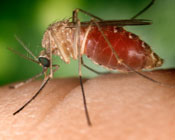
The Western equine encephalitis virus (WEEV) is an arthropod-borne virus, seen primarily in states west of the Mississippi River in the United States. The disease caused by this virus — Western equine encephalitis or encephalomyelitis (WEE) — is also seen in countries of South America. WEE is commonly a subclinical infection; symptomatic infections are uncommon. However, the disease can cause serious long-tem complications in infants and children.
Unlike Eastern equine encephalitis, the overall morty of WEE is low (approximately 4%) and is associated mostly with infection in the elderly. There is no vaccine for WEE, nor are therapeutic drugs licensed in the U.S. for this infection. Since 1964, there have been fewer than 700 confirmed cases in the U.S.*
Vector insects
WEE is transmitted by mosquitoes of the Culex and Culiseta genera, with Culex tarsalis being the most common vector:- Culex
- Culiseta

Resources
Learn more about Western Equine Encephalitis Virus disease
Quick Links
Contact a Valent BioSciences public health representative.
Contact Us